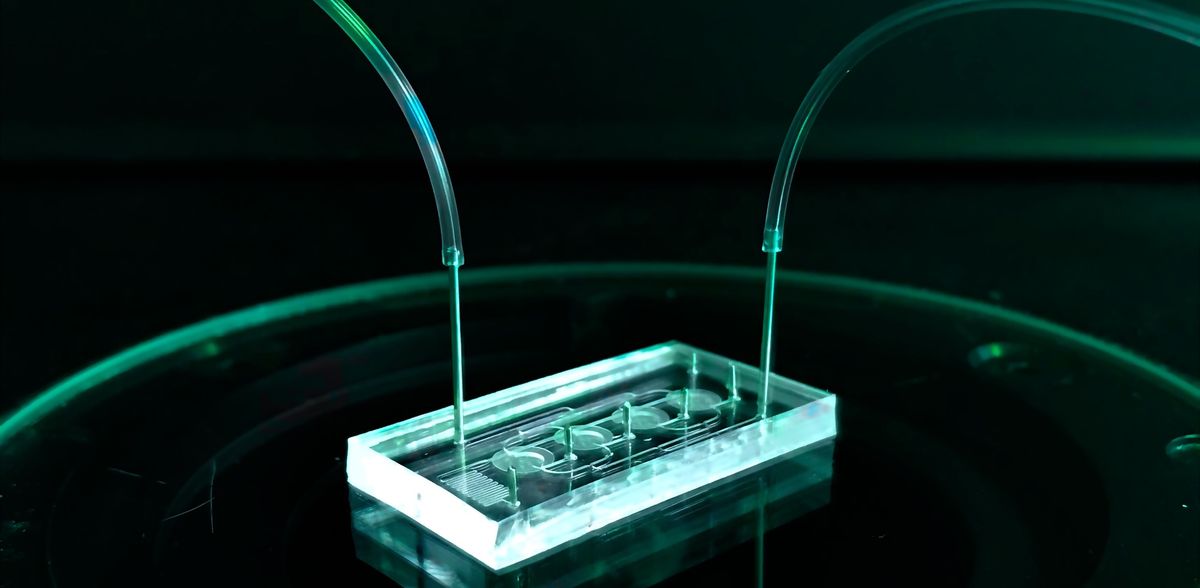Unraveling female resilience
Leveraging organ-on-chip technology to study the impact of menopause on immunological and metabolic resilience
Dynamic resilience, the ability of humans to withstand unexpected changes and stressors, is pivotal for maintaining bodily functions and overall health. Aging adults and especially women after menopause are at higher risk of adverse health outcomes (including frailty) in response to external stress situations such as cancer therapies or infections due to reduced dynamic resilience. Addressing the impact of female menopause on dynamic resilience and exploring preventive and therapeutic strategies is the aim of an international and interdisciplinary research group led by Prof. Dr. Peter Loskill from the NMI Natural and Medical Sciences Institute and the Eberhard Karls University of Tübingen.
Tackling Sex Disparities in Aging Research
This ambitious research endeavor seeks to unravel the connections between metabolism, the immune system, and dynamic resilience in pre- and post-menopausal women, thus uniquely addressing sex disparities prevalent in aging research.
"Currently, there exists a substantial gap in our ability to comprehensively study dynamic resilience. Our project endeavors to bridge this gap by creating a resilience-on-chip platform that fuses advanced technology with expertise from diverse fields," elucidated Prof. Dr. Peter Loskill, professor for organ-on-chip systems and head of the 3R Center Tübingen at the Eberhard Karls University of Tübingen and the NMI.
Harnessing Cutting-Edge Bioengineering and Bioinformatics
To tackle their ambitious research goals, the international team will harness organ-on-chip and single cell genomics technologies. Hormone-sensitive organs, including white adipose tissue, liver, and lymphatic tissues, are generated outside the human body based on cells from female donors. These cells are cultured in polymer chips roughly the size of a 1 €-coin and interconnected via synthetic blood vessels. These test platforms enable crucial insights into the interplay between metabolism, immune system, and dynamic resilience in pre- and post-menopausal women. By utilizing cells from various life stages, the researchers can analyze and compare changes in immune metabolism resulting from diverse stressors, simulating, and exploring conditions such as chemotherapy, hormonal shifts, and infections.
Collaborative Synergy for Enhancing Women's Health
The collaborative team also includes co-principal investigators Dr. Roser Vento-Tormo from the Wellcome Sanger Institute, Cambridge, UK, Prof. Dr. Stefan Krauss from the University of Oslo, Norway, and Dr. Nicole Schneiderhan-Marra also from the NMI. Their collective efforts promise to illuminate how energy metabolism, immune responses, and inflammation influence resilience and transform over a woman's lifespan.
"Prioritizing the closure of gender gaps in medical research, our project marks a significant stride in that direction. We are resolute in leveraging our combined expertise to drive positive transformation and enhance the well-being of women globally," emphasized Dr. Nicole Schneiderhan-Marra, division head of Pharma and Biotech at the NMI.
Topics
Organizations
Other news from the department science

Get the analytics and lab tech industry in your inbox
By submitting this form you agree that LUMITOS AG will send you the newsletter(s) selected above by email. Your data will not be passed on to third parties. Your data will be stored and processed in accordance with our data protection regulations. LUMITOS may contact you by email for the purpose of advertising or market and opinion surveys. You can revoke your consent at any time without giving reasons to LUMITOS AG, Ernst-Augustin-Str. 2, 12489 Berlin, Germany or by e-mail at revoke@lumitos.com with effect for the future. In addition, each email contains a link to unsubscribe from the corresponding newsletter.



























































